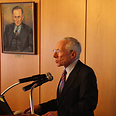
BOI buys forex for 1st time since 2011
Central bank resumes its battle against strong shekel, buying at least $100 million of foreign currency for first time in nearly two years after shekel reaches 17-month peak that may further harm exports, economy
The central bank confirmed its presence in the foreign exchange market, citing in a statement its 2009 policy that it would intervene when the exchange rate failed to properly reflect the economy, or if the market became disorderly.
Dealers estimated the central bank bought at least $100 million of foreign currency as the dollar fell below a level of NIS 3.6, its weakest level since October 2011. At the same time, the euro reached NIS 4.66, its lowest since January 2011.
Though Monday's statement was the first time the Bank of Israel confirmed its intervention on the day it took place, it did not provide details of its actions.
"So far, it's not a lot ... but they are taking a stand," said a dealer at a large Israeli bank.
Between March 2008 and July 2011, the Bank of Israel fought hard to contain the shekel's appreciation, buying some $50 billion that boosted its foreign exchange reserves to close to $80 billion.
Since then, the Bank of Israel never formally announced an end to its intervention policy and Bank of Israel Governor Stanley Fischer told Reuters Television earlier this year that it would intervene again if it thinks the shekel has moved away from its fundamental value.
From July 2011, the shekel gradually depreciated from 3.4 per dollar to a low of 4.08 last July, making intervention unnecessary until recently. It has gained from 3.70 in mid-March and analysts and dealers had been expecting central bank buying when dollar-shekel breached below 3.6.
Policy may change after Fischer leaves
The intervention moved the dollar back to 3.625 shekels but analysts believe more buying will be necessary to prevent the shekel from gaining further.
That's especially the case as euro-dollar is close to a two-week high at $1.3022, Israel's benchmark interest rate of 1.75% is well above that of the US Federal Reserve and European Central Bank's rates, and as the start to natural gas production could lead to gas exports.
"The Bank of Israel needed to buy at least another $200-$300 million to support the dollar," said Joseph Fraiman, chief executive at Prico Risk Management and Investments.
Fraiman believes the central bank will attempt to prevent the shekel from gaining beyond 3.55-3.58 per dollar to mitigate the impact more expensive exports would have on the economy.
Exports, which account for some 40% of Israel's economic activity, grew just 0.1% in 2012 while economic growth slowed to 3.1% from 4.6% in 2011.
The central bank expects 2.8% growth excluding the start of natural gas production in 2013. For weeks, exporters have called on the Bank of Israel to intervene.
Yaniv Pagot, chief strategist of the Ayalon Group, said the Bank of Israel reluctantly intervened in the market to prevent damage to exporters.
"In a world where the dollar is every day losing a few cents against the shekel, exporters and speculators could act first by selling dollars and benefit from shekel interest rates that are substantially higher than dollar interest rates," he said.
Pagot doubted the central bank would be as aggressive in this round since foreign currency reserves were already very high. The policy could also change after Fischer leaves his post at the end of June.
"Will Fischer's replacement ... adopt the activism of Fischer in the currency market or will he move to the back seat and allow market forces to work?" he asked.










